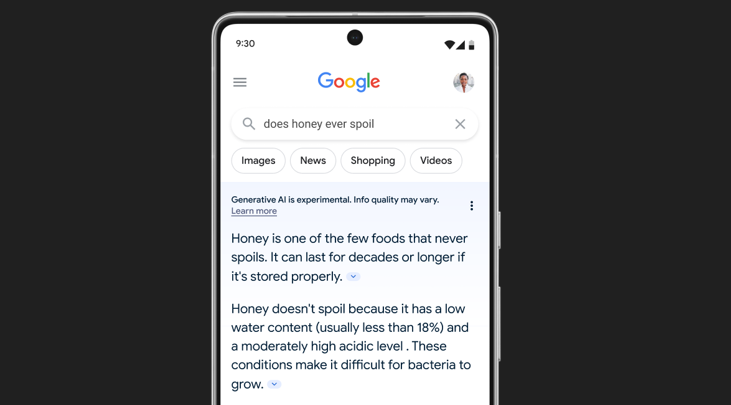Product of the Day
Google drops SA in hardware, but adds it to AI search
Even as the Fitbit is pulled from the local market, South Africa gets Search Generative Experience, writes ARTHUR GOLDSTUCK.
Google doesn’t think much of South African consumers. We’ve always suspected that, as it has never launched or made available a physical consumer technology product in this country.
From Google Pixel smartphones to Google Home smart speakers, it has regarded this market as insignificant in its global roll-out strategy. The fact that it was selling Fitbit devices here was an accident: it acquired brand after local distributors and public relations companies – and savvy consumers – had turned it into the local market leader.
Those days are gone. Last week Google announced it was withdrawing Fitbit from the local market. Distributors of the Apple Watch, Samsung Watch and Huawei Watch are cheering, but it is a slap in the face of loyal consumers.
As a consolation prize, in almost the same breath, however, Google announced that it would roll out Search Generative Experience (SGE), a new generative AI experience in Search, to South Africa.
It’s a great service, and will be welcomed by users. However, it does not mean a special focus on South Africa. This was one of a hundred new locations, including Sub-Saharan Africa (SSA) and several Spanish-speaking nations, announced last week.
This means that, if Google can serve the South African consumer at the press of a button, it will do.so. If it must engage in any heavy lifting, i.e. shipping product, we are on our own.
But let’s take what we can get. Thanks to a strong local sales office, Google dominates online advertising in South Africa, via its search engine. We should expect nothing less than to enjoy the same search powers that the rest of the world accesses.
This is what Google told us about SGE:
With SGE’s generative AI capabilities in Search, people will see an AI-powered overview of key information to consider, with links to dig deeper. For anyone who has ever been overwhelmed by the amount of information online, this will help find answers more quickly.
For instance, with a question like “Does Honey ever Spoil?” Normally, you might break this question down into smaller ones, sort through the vast amount of information available, and then start to piece things together yourself. With generative AI, Search can do some of that heavy lifting.
SGE first delivers an overview, and beneath this, users will see suggested next steps where they can simply tap a query like “What is the oldest honey ever eaten?”, or type in a specific follow-up question. This conversational experience enables people to intuitively learn more about the topic they’re exploring.
Context will be carried over from question to question, to help people more naturally continue their exploration.
Featuring a wide range of voices and sources
Hearing insights from others is always useful when making decisions, so Google has designed these new experiences to highlight and drive attention to content on the web, making it easy for people to dive deeper on the topic they’re learning about. As generative AI makes its way into Search, Google is committed to continue sending valuable traffic to sites across the web. With SGE, Google is showing more links, and links to a wider range of sources on the results page, creating new opportunities for content to be discovered.
Ads are a vital piece of how the web works, and help people find relevant products and services. In this new generative experience, Search ads will continue to appear in dedicated ad slots throughout the page. Google will continue to uphold its commitment to ads transparency and making sure ads are distinguishable from organic search results. When Search ads do appear, they will continue to feature their industry-leading clear and transparent ad labels with the “Sponsored” label in bold black text.
Taking a responsible approach
Google is taking a responsible and deliberate approach to bringing new generative AI capabilities to Search. The company has trained the models used in SGE to uphold Search’s high bar for quality, which will continue to improve over time. These hallmark systems have been fine-tuned for decades, but will also have additional guardrails, like limiting the types of queries where generative AI capabilities will appear.
GM for Search in Africa, Wambui Kinya, said: “With new generative AI capabilities in Search, we’re now taking more of the work out of searching. We’re imagining a supercharged Search that does the heavy lifting for you so you’ll be able to understand a topic faster, uncover new viewpoints and insights, and get things done more easily.
“This Search Generative Experience is the first step we’re taking in this journey, and part of our vision to make Search radically more helpful. We’re excited to bring this to the SSA region, and look forward to receiving feedback and iterating on the experience alongside our users over the next few months.”
Sign up in Search Labs
Google is bringing SGE as an experiment in Search Labs, available on Chrome desktop and the latest version of the Google App on Android and iOS. Access via Chrome desktop is available today, and access through the Google app will be enabled over the coming week. – people can opt in to try it out and share feedback directly with the teams working on it.
Tap the Labs icon in the Google app or Chrome desktop and visit labs.google.com/search to learn more.

















